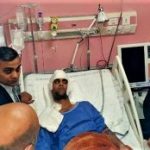Safwat Shehata, a man in his 40s from Upper Egypt’s Minya Governorate, stands outside the entrance of the emergency room at the Sheikh Zayed Hospital on the outskirts of Cairo. Inside, four of his relatives are receiving treatment for injuries sustained in Friday’s militant attack, in which gunmen ambushed Coptic Christians returning from a trip to the St. Samuel Monastery in Minya.
The assailants injured at least 20 people in the attack and killed seven more. Six of those killed were Shehata’s relatives, ranging in age from 12 to 55 years old.
At first, Safwat was unaware that his relatives were killed and injured in the attack — he did not even know they were visiting the monastery that day. “I saw news of the attack on the internet and I scrolled through the pictures on social media. I thought that the casualties were from [the governorate of] Sohag. I didn’t know that my cousins and their families were going on that day,” he says.
Seeing images of bodies covered in blood, Safwat asked God to have mercy on their souls. He kept monitoring news of the attack on Facebook until he received a call from a relative informing him that his cousin-in-law, Youssef Shehata, and five members of his family were dead.
“You must go and save the wounded in Cairo,” the relative told Safwat between cries. “The bodies are being buried here.”
Safwat was unable to attend his relatives’ burial because he had to go and support those who had been injured. “Three men and their children were killed. Only my female cousins and two children survived. Four families have been completely destroyed. Snatched away by death.”
On Friday morning, Youssef Shehata and nine of his relatives prepared to visit to the St. Samuel Monastery, also known as the Monastery of the Virgin Mary at Qalamoun.
As they were returning from the monastery, masked assailants intercepted the microbus. According to Shehata, they aimed their guns at the passengers and said they had a message for the women on board. “My cousins said that the attackers told them, ‘We will kill the men and children and leave you to live the rest of your lives in misery.’”
He shares more details from the stories he collected from the survivors. “The microbus driver tried to flee, but the bus was surrounded by the attackers,” he relays. “They killed the driver first, shooting him in the head. Then they stopped the bus completely and no one could get away.”
Visits to the St. Samuel Monastery were banned due to a similar incident that occurred on the road to the monastery in May 2017, when militants ambushed a bus in a similar attack, killing 28 people, most of whom were children, and injuring more than 20 others. “They said it was forbidden to visit the monastery, but people still continued to go after the incident and nothing happened,” Safwat says.
After a brief conversation, Safwat returns to the hospital reception, hoping to be able to see his relatives. “Aida and Ghada are injured, as well as two children — their nephew, who was shot and is suffering from internal bleeding, and another cousin of mine, who was shot in the back.”
“We do not fear death,” Safwat says, despite the fear apparent on his face. Overcome by tears, he then sobs: “People should be safe. There should be access to communication networks on that road … Our people tried to seek aid and reach out to someone, but they had no cell service.”
________________________
https://madamasrmirror.appspot.com/www.madamasr.com/en/2018/11/06/feature/politics/we-will-kill-the-men-and-children-and-leave-you-to-live-the-rest-of-your-lives-in-misery/?fbclid=IwAR1KfMuwtrPWkjtxppDrmcGh9sou-mojUiUoj4yM2ZQw1z2SUGYz_ohMNDg



